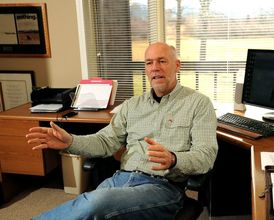 Greg Gianforte, courtesy of Billings Gazette
Greg Gianforte, courtesy of Billings Gazette
Whitney has been News Director of Montana Public Radio since September 2014. Before that he worked for Kaiser Health News as a freelance journalist. Prior to that he was a health reporter for Colorado Public radio, a position he held for five years, beginning in 2008. He did a short stint in Colorado radio before that, and prior to that he was a freelance journalist in South Africa, starting in 2004.
Why do I list all this? Because it’s important to realize who’s asking the questions of Gianforte. What were those questions like? Let’s get into it.
Gianforte thinks Montana has potential and with good leadership you can have wage growth. He mentions how kids have to leave to find good paying jobs.
Whitney mentions how the economy is doing well.
Gianforte “thinks better is possible.” He again cites the low wage jobs and people “working paycheck to paycheck.” He mentions how only one kid is going to get the farm or ranch in a large family, and the rest of the kids have to leave.
Whitney asks about Gianforte’s business experience.
The gubernatorial hopeful says he’s “walked in the shoes of a small business owner,” so he “understands the burden” that new taxes bring. He points out that “this is where new jobs are created,” with small businesses. He feels he can do the best job creating a “vibrant” private sector.
Whitney asks the difference between running a business and running a government.
Gianforte kind of dodged this one, saying that he’s just exploring the idea. “I don’t have all the answers,” he says, but mentions his training as an engineer and how he seeks answers.
Whitney mentions the frustration felt in government services, and how this differs from private business and what can be done. He asks about those challenges.
“Government moves a lot slower than business does,” Gianforte mentions. He didn’t mention his lack of government experience. He did say patience and “finding a common ground” are important.’
He wants to help kids get the “best education possible.” He wants a “thriving private sector” where people don’t have to leave. So he’s already falling back on the campaign talking points.
Whitney asks which representatives Gianfort is most like.
Gianforte discusses his diverse management team while he was in business. He says “ideas outside the pale” are alright, and that we “need a diverse set of views.” He tries more than anything to “build consensus.” Right now, Gianforte says, we focus too much on the details.
There’s talk by Gianforte to see “more collaboration between the governor and the legislature.” He wants to see the burden on small business reduced. He mentions the vetoes he didn’t like, and he again stresses his business experience. He falls back on good jobs, the need for good pay, and how people are leaving the state.
“Hey, people love Montana, our quality of life is just fantastic,” he says. He mentions again his ability to start a business out of a spare bedroom in his house. He wants “a more diversified economy in our state.”
Whitney pressed Gianforte on who he liked in the National Republican presidential race, but Gianforte said he wasn’t going to declare.
When Whitney pressed Gianforte on his platform, the gubernatorial-hopeful said he “wasn’t ready to roll that out” just yet, which is understandable, because he just filed his C-1 yesterday.
He’s going to focus on what he learned from Montanans, he said.
Whitney then questioned Gianforte on when he hired his campaign staff, around 9:45 minutes into the interview.
Gianforte says he does a lot of stuff around Montana, but says his campaign didn’t start until yesterday, when he filed.
Whitney asks about the exploratory committee, and also self-financing.
“I haven’t decided whether I’m going to write a check to the campaign or not,” Gianforte says. He again mentions young people leaving the state. Boy, this guy is on message.
At one point (12:00) he said some accusations against him were silly. He says how he helps the Social Security Administration, even though he's blamed for hurting it. He’d rather focus on a “substantive conversation with Montana” than those kinds of accusations.
Whitney then asks him to clear up those accusations about Social Security.
Gianforte says that he wants people to “use their God-given skills” to succeed in life, and he stands by that idea.
Whitney then presses Gianforte on his wealth, which was just listed at $1.5 billion because that’s what his company sold for.
Gianforte says “he was very fortunate and blessed” for Oracle to purchase the business for $1.8 billion, with 20% of that going to employees, something that caused Gallatin County’s earnings to jump by 14% that year.
He points out “210 other high tech businesses around the state” that show his success is not unique.
Whitney asks about the new campaign finance rules and funding.
Gianforte wants transparency and says he’s “only taking money from individuals.”
Whitney asks why Montanans shouldn’t vote for him.
Gianforte says he’ll put his message out and if it works, he’ll be governor. “It’s really not about Greg, it’s about what’s best for the state.”
Gianforte says public service “is a nasty and vile place,” and I think he’s referring to politics.
Whitney asks about education at that point and religious schools and his massive donations to those causes.
Gianforte talks about children reaching their full potential. He again talks about his success in Montana, and how this has allowed him to give a lot of money away. Much goes to non-profits and “helps low-income kids get a better education.” It’s their money and “they decided they want to put it back into the community.” He discusses getting better computers into the high schools, he discusses our trade schools and how “not everyone’s going get a 4-year degree.”
“The spark for the private sector is entrepreneuriship,” Gianforte says, and that “we need to provide options.”
Whitney asks about state funding for private religious schools.
Gianforte didn’t go into specifics, and mentioned the challenges that rural schools are facing. He mentions “digital delivery” and other methods to cultivate “the next Einstein.”
Whitney asks about Christian education and why Gianforte supports this so much with funding.
Gianforte mentions a successful program in Denver, and 60 schools with “700 kids on scholarship” from “low and moderate income” families here in Montana. This took graduation from 50% to 90%. He says the “programs are wildly over-subscribed” and popular.
Whitney then asks about Gianforte’s faith.
“My faith in God is very important to me,” he says, but if elected, “he needs to be governor of every single Montanan” and he would focus on his business qualities when in Helena.
Whitney asks about the creationist museum around 21:00 minutes into the interview.
Gianforte talks about how the museum in Glendive applied for a Gianforte Foundation grant, and how he gave it to them because he liked the dinosaur displays. He mentions how it’s had 50,000 visitors and has “been an economic boon to Glendive.” Also, since the “controversy,” attendance to the museum has gone way up, so he hopes it continues to be a topic of discussion.
Whitney asks about discrimination.
Gianforte says that “discrimination is wrong” and goes into his mantra that he’s governor of everyone.
Gianforte also says he thinks marriage is between one man and one woman but realizes our Supreme Court doesn’t think like that.
Whitney asks what people should know about Gianforte that they don’t know.
The interview goes dead for a few seconds, and then Gianforte mentions how it’s a sacrifice for him and his family to run for governor, but he “loves Montana” and “doesn’t have a vacation home someplace else.”
He says “Montana is 49th in the country for wages” and brings up the young people leaving again.
Whitney asks about Gianforte’s timeline next.
Gianforte says the next step is “getting out and talking to people.” When he builds a consensus he’ll make a “follow-up decision.”
That was the interview. Now let’s see how the mainstream media cuts it up and tears it apart.

